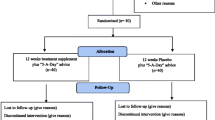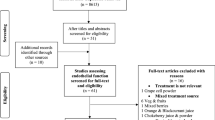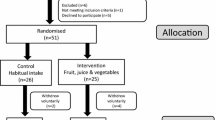Abstract
The foods and nutrients discussed in this paper are components of dietary patterns that have been associated with lower cardiovascular disease risk. The focus of this review is on the effects of antioxidant foods on vascular health and discussion of their potential mechanisms of action. The foods reviewed include fruits and vegetables, red grapes and red wine, tea, cocoa/chocolate, and olive oil. The primary challenge in studying the cardioprotective components of a dietary pattern is in identifying mechanism(s) of action as well as the bioactive nutrients responsible. In selecting papers for this review, we focused on studies of whole foods and beverages that met the following criteria: 1) they are commonly consumed in typical diets, 2) they appear to have direct antioxidant effects, and 3) they have demonstrated effects on endothelial function in several human studies. The evidence presented herein suggests that dietary consumption of fruits and vegetables, red grapes and red wine, tea, chocolate, and olive oil may improve vascular reactivity, in part, by attenuating the adverse effects of oxidation on endothelial function. Additional research is needed to better understand the mechanism(s) by which antioxidant-rich foods and beverages favorably affect endothelial function and the extent to which this reflects direct antioxidant effects.
Similar content being viewed by others
References and Recommended Reading
Willett WC: The Mediterranean diet: science and practice. Public Health Nutr 2006, 9(1A):105–110.
de Lorgeril M, Salen P, Martin JL, et al.: Mediterranean diet, traditional risk factors, and the rate of cardiovascular complications after myocardial infarction: final report of the Lyon Diet Heart Study. Circulation 1999, 99:779–785.
Meydani M: Nutrition, immune cells, and atherosclerosis. Nutr Rev 1998, 56(1 Pt 2):S177–182.
Willcox JK, Ash SL, Catignani GL: Antioxidants and prevention of chronic disease. Crit Rev Food Sci Nutr 2004, 44:275–295.
Brown AA, Ilu FB: Dietary modulation of endothelial function: implications for cardiovascular disease. Am J Clin Nutr 2001, 73:673–686.
Vita JA: Polyphenols and cardiovascular disease: effects on endothelial and platelet function. Am J Clin Nutr 2005, 81(1 Suppl):292S-297S.
Parthasarathy S, Khan-Merchant N, Penumetcha M, Santanam N: Oxidative stress in cardiovascular disease. J Nucl Cardiol 2001, 8:379–389.
Kritharides L, Stocker R: The use of antioxidant supplements in coronary heart disease. Atherosclerosis 2002, 164:211–219.
Yarnell JW, Evans AE: The Mediterranean diet revisited—towards resolving the (French) paradox. QJM 2000, 93:783–785.
de Lorgeril M, Salen P, Paillard F, et al.: Mediterranean diet and the French paradox: two distinct biogeographic concepts for one consolidated scientific theory on the role of nutrition in coronary heart disease. Cardiovasc Res 2002, 54:503–515.
Ding EL, Hutfless SM, Ding X, Girotra S: Chocolate and prevention of cardiovascular disease: a systematic review. Nutr Metab (Lond) 2006, 3:2.
Mukamal KJ, Maclure M, Muller JE, et al.: Tea consumption and mortality after acute myocardial infarction. Circulation 2002, 105:2476–2481.
Bowen PE, Borthakur G: Postprandial lipid oxidation and cardiovascular disease risk. Curr Atheroscler Rep 2004, 6:477–484.
Pereira IR, Bertolami MC, Faludi AA, et al.: Lipid peroxidation and nitric oxide inactivation in postmenopausal women. Arq Bras Cardiol 2003, 80:406–423.
Doi H, Kugiyama K, Ohgushi M, et al.: Membrane active lipids in remnant lipoproteins cause impairment of endothelium-dependent vasorelaxation. Arterioscler Thromb Vasc Biol 1999, 19:1918–1924.
Langseth L: Oxidants, Antioxidants, and Disease Prevention. International Life Sciences Institute (ILSI) Europe concise monograph series. Washington, DC: ILSI Press; 1995.
West SG: Effect of diet on vascular reactivity: an emerging marker for vascular risk. Curr Atheroscler Rep 2001, 3:446–455.
Armstrong EJ, Morrow DA, Sabatine MS: Inflammatory biomarkers in acute coronary syndromes: part I: introduction and cytokines. Circulation 2006, 113:e72–75.
Armstrong EJ, Morrow DA, Sabatine MS: Inflammatory biomarkers in acute coronary syndromes: part II: acute-phase reactants and biomarkers of endothelial cell activation. Circulation 2006, 113:e152–155.
Armstrong EJ, Morrow DA, Sabatine MS: Inflammatory biomarkers in acute coronary syndromes: part III: biomarkers of oxidative stress and angiogenic growth factors. Circulation 2006, 113:e289–292.
Maytin M, Leopold J, Loscalzo J: Oxidant stress in the vasculature. Curr Atheroscler Rep 1999, 1:156–164.
Nambi V: The use of myeloperoxidase as a risk marker for atherosclerosis. Curr Atheroscler Rep 2005, 7:127–131.
Lau D, Baldus S: Myeloperoxidase and its contributory role in inflammatory vascular disease. Pharmacol Ther 2006, 111:16–26.
Wassmann S, Wassmann K, Nickenig G: Regulation of antioxidant and oxidant enzymes in vascular cells and implications for vascular disease. Curr Hypertens Rep 2006, 8:69–78.
Hennig B, Toborek M, McClain CJ, Diana JN: Nutritional implications in vascular endothelial cell metabolism. J Am Coll Nutr 1996, 15:345–358.
Cuevas AM, Germain AM: Diet and endothelial function. Biol Res 2004, 37:225–230.
Zeiher AM, Drexler H, Wollschlager H, Just H: Modulation of coronary vasomotor tone in humans. Progressive endothelial dysfunction with different early stages of coronary atherosclerosis. Circulation 1991, 83:391–401.
Moens AL, Goovaerts I, Claeys MJ, Vrints CJ: Flow-mediated vasodilation: a diagnostic instrument, or an experimental tool? Chest 2005, 127:2254–2263.
Chan SY, Mancini GB, Kuramoto L, et al.: The prognostic importance of endothelial dysfunction and carotid atheroma burden in patients with coronary artery disease. J Am Coll Cardiol 2003, 42:1037–1043.
Corretti MC, Anderson TJ, Benjamin EJ, et al.: Guidelines for the ultrasound assessment of endothelial-dependent flow-mediated vasodilation of the brachial artery: a report of the International Brachial Artery Reactivity Task Force. J Am Coll Cardiol 2002, 39:257–265.
West SG, Hecker KD, Mustad VA, et al.: Acute effects of monounsaturated fatty acids with and without omega-3 fatty acids on vascular reactivity in individuals with type 2 diabetes. Diabetologia 2005, 48:113–122.
Lekakis J, Rallidis LS, Andreadou I, et al.: Polyphenolic compounds from red grapes acutely improve endothelial function in patients with coronary heart disease. Eur J Cardiovasc Prev Rehabil 2005, 12:596–600.
Chou EJ, Keevil JG, Aeschlimann S, et al.: Effect of ingestion of purple grape juice on endothelial function in patients with coronary heart disease. Am J Cardiol 2001, 88:553–555.
Toshima S, Hasegawa A, Kurabayashi M, et al.: Circulating oxidized low density lipoprotein levels. A biochemical risk marker for coronary heart disease. Arterioscler Thromb Vasc Biol 2000, 20:2243–2247.
Meisinger C, Baumert J, Khuseyinova N, et al.: Plasma oxidized low-density lipoprotein, a strong predictor for acute coronary heart disease events in apparently healthy, middle-aged men from the general population. Circulation 2005, 112:651–657.
Kaplan M, Aviram M: Oxidized low density lipoprotein: atherogenic and proinflammatory characteristics during macrophage foam cell formation. An inhibitory role for nutritional antioxidants and serum paraoxonase. Clin Chem Lab Med 1999, 37:777–787.
Matsumoto T, Takashima H, Ohira N, et al.: Plasma level of oxidized low-density lipoprotein is an independent determinant of coronary macrovasomotor and microvasomotor responses induced by bradykinin. J Am Coll Cardiol 2004, 44:451–457.
Heitzer T, Yla-Herttuala S, Luoma J, et al.: Cigarette smoking potentiates endothelial dysfunction of forearm resistance vessels in patients with hypercholesterolemia. Role of oxidized LDL. Circulation 1996, 93:1346–1353.
Botti H, Trostchansky A, Batthyany C, Rubbo H: Reactivity of peroxynitrite and nitric oxide with LDL. IUBMB Life 2005, 57:407–412.
Manson JE, Gaziano JM, Jonas MA, Hennekens CH: Antioxidants and cardiovascular disease: a review. J Am Coll Nutr 1993, 12:426–432.
Hamilton CA: Low-density lipoprotein and oxidised low-density lipoprotein: their role in the development of atherosclerosis. Pharmacol Ther 1997, 74:55–72.
Duthie GG, Bellizzi MC: Effects of antioxidants on vascular health. Br Med Bull 1999, 55:568–577.
Roberts WG, Gordon MH, Walker AF: Effects of enhanced consumption of fruit and vegetables on plasma antioxidant status and oxidative resistance of LDL in smokers supplemented with fish oil. Eur J Clin Nutr 2003, 57:1303–1310.
Zern TL, Fernandez ML: Cardioprotective effects of dietary polyphenols. J Nutr 2005, 135:2291–2294.
Covas MI, Konstantinidou V, Mysytaki E, et al.: Postprandial effects of wine consumption on lipids and oxidative stress biomarkers. Drugs Exp Clin Res 2003, 29(5–6):217–223.
Avellone G, Di Garbo V, Campisi D, et al.: Effects of moderate Sicilian red wine consumption on inflammatory biomarkers of atherosclerosis. Eur J Clin Nutr 2006, 60:41–47.
Erba D, Riso P, Bordoni A, et al.: Effectiveness of moderate green tea consumption on antioxidative status and plasma lipid profile in humans. J Nutr Biochem 2005, 16:144–149.
Hirano-Ohmori R, Takahashi R, Momiyama Y, et al.: Green tea consumption and serum malondialdehyde-modified LDL concentrations in healthy subjects. J Am Coll Nutr 2005, 24:342–346.
Mursu J, Voutilainen S, Nurmi T, et al.: Dark chocolate consumption increases HDL cholesterol concentration and chocolate fatty acids may inhibit lipid peroxidation in healthy humans. Free Radic Biol Med 2004, 37:1351–1359.
Covas MI, de la Torre K, Farre-Albaladejo M, et al.: Postprandial LDL phenolic content and LDL oxidation are modulated by olive oil phenolic compounds in humans. Free Radic Biol Med 2006, 40:608–616.
Moore K, Roberts LJ 2nd: Measurement of lipid peroxidation. Free Radic Res 1998, 28:659–671.
Romero FJ, Bosch-Morell F, Romero MJ, et al.: Lipid peroxidation products and antioxidants in human disease. Environ Health Perspect 1998, 106(Suppl 5):1229–1234.
Maritim AC, Sanders RA, Watkins JB 3rd: Diabetes, oxidative stress, and antioxidants: a review. J Biochem Mol Toxicol 2003, 17:24–38.
Sies H, Stahl W, Sevanian A: Nutritional, dietary and postprandial oxidative stress. J Nutr 2005, 135:969–972.
Anderson RA, Evans ML, Ellis GR, et al.: The relationships between post-prandial lipaemia, endothelial function and oxidative stress in healthy individuals and patients with type 2 diabetes. Atherosclerosis 2001, 154:475–483.
Vita JA, Brennan ML, Gokce N, et al.: Serum myeloperoxidase levels independently predict endothelial dysfunction in humans. Circulation 2004, 110:1134–1139.
Witting PK, Wu BJ, Raftery M, et al.: Probucol protects against hypochlorite-induced endothelial dysfunction: identification of a novel pathway of probucol oxidation to a biologically active intermediate. J Biol Chem 2005, 280:15612–15618.
Kostyuk VA, Kraemer T, Sies H, Schewe T: Myeloperoxidase/nitrite-mediated lipid peroxidation of low-density lipoprotein as modulated by flavonoids. FEBS Lett 2003, 537:146–150.
Ventura P, Bini A, Panini R, et al.: Red wine consumption prevents vascular oxidative stress induced by a high-fat meal in healthy volunteers. Int J Vit Nutr Res 2004, 74:137–143.
Napoli R, Guardasole V, Angelini V, et al.: Food and red wine do not exert acute effects on vascular reactivity. Metabolism 2004, 53:1081–1086.
Napoli R, Cozzolino D, Guardasole V, et al.: Red wine consumption improves insulin resistance but not endothelial function in type 2 diabetic patients. Metabolism 2005, 54:306–313.
Folts JD: Potential health benefits from the flavonoids in grape products on vascular disease. Adv Exp Med Biol 2002, 505:95–111.
Belleville J: The French paradox: possible involvement of ethanol in the protective effect against cardiovascular diseases. Nutrition 2002, 18:173–177.
Caimi G, Carollo C, Lo Presti R: Wine and endothelial function. Drugs Exp Clin Res 2003, 29:235–242.
Dell’Agli M, Busciala A, Bosisio E: Vascular effects of wine polyphenols. Cardiovasc Res 2004, 63:593–602.
de Moura RS, Miranda DZ, Pinto AC, et al.: Mechanism of the endothelium-dependent vasodilation and the antihypertensive effect of Brazilian red wine. J Cardiovasc Pharmacol 2004, 44:302–309.
Stoclet JC, Chataigneau T, Ndiaye M, et al.: Vascular protection by dietary polyphenols. Eur J Pharmacol 2004, 500:299–313.
Wu JM, Wang ZR, Hsieh TC, et al.: Mechanism of cardioprotection by resveratrol, a phenolic antioxidant present in red wine [review]. Int J Mol Med 2001, 8:3–17.
Boban M, Modun D, Music I, et al.: Red wine induced modulation of vascular function: separating the role of polyphenols, ethanol, and urates. J Cardiovasc Pharmacol 2006, 47:695–701.
Agewall S, Wright S, Doughty RN, et al.: Does a glass of red wine improve endothelial function? Eur Heart J 2000, 21:74–78.
Hashimoto M, Kim S, Eto M, et al.: Effect of acute intake of red wine on flow-mediated vasodilatation of the brachial artery. Am J Cardiol 2001, 88:1457–1460, A9.
Stein JH, Keevil JG, Wiebe DA, et al.: Purple grape juice improves endothelial function and reduces the susceptibility of LDL cholesterol to oxidation in patients with coronary artery disease. Circulation 1999, 100:1050–1055.
Whelan AP, Sutherland WH, McCormick MP, et al.: Effects of white and red wine on endothelial function in subjects with coronary artery disease. Intern Med J 2004, 34:224–228.
Nagyova A, Haban P, Klvanova J, Kadrabova J: Effects of dietary extra virgin olive oil on serum lipid resistance to oxidation and fatty acid composition in elderly lipidemic patients. Bratisl Lek Listy 2003, 104(7–8):218–221.
Ruano J, Lopez-Miranda J, Fuentes F, et al.: Phenolic content of virgin olive oil improves ischemic reactive hyperemia in hypercholesterolemic patients. J Am Coll Cardiol 2005, 46:1864–1868.
Weinbrenner T, Fito M, de la Torre R, et al.: Olive oils high in phenolic compounds modulate oxidative/antioxidative status in men. J Nutr 2004, 134:2314–2321.
Fito M, Cladellas M, de la Torre R, et al.: Antioxidant effect of virgin olive oil in patients with stable coronary heart disease: a randomized, crossover, controlled, clinical trial. Atherosclerosis 2005, 181:149–158.
Vogel RA, Corretti MC, Plotnick GD: The postprandial effect of components of the Mediterranean diet on endothelial function. J Am Coll Cardiol 2000, 36:1455–1460.
de Roos NM, Bots ML, Siebelink E, et al.: Flow-mediated vasodilation is not impaired when HDL-cholesterol is lowered by substituting carbohydrates for monounsaturated fat. Br J Nutr 2001, 86:181–188.
Williams MJ, Sutherland WH, McCormick MP, et al.: Normal endothelial function after meals rich in olive or safflower oil previously used for deep frying. Nutr Metab Cardiovasc Dis 2001, 11:147–152.
Perona JS, Cabello-Moruno R, Ruiz-Gutierrez V: The role of virgin olive oil components in the modulation of endothelial function. J Nutr Biochem 2006, 17:429–445.
Kris-Etherton PM, Keen CL: Evidence that the antioxidant flavonoids in tea and cocoa are beneficial for cardiovascular health. Curr Opin Lipidol 2002, 13:41–49.
Sesso HD, Gaziano JM, Buring JE, Hennekens CH: Coffee and tea intake and the risk of myocardial infarction. Am J Epidemiol 1999, 149:162–167.
Weisburger JH: Tea and health: the underlying mechanisms. Proc Soc Exp Biol Med 1999, 220:271–275.
Hodgson JM, Burke V, Puddey IB: Acute effects of tea on fasting and postprandial vascular function and blood pressure in humans. J Hypertens 2005, 23:47–54.
Duffy SJ, Vita JA: Effects of phenolics on vascular endothelial function. Curr Opin Lipidol 2003, 14:21–27.
Hodgson JM, Puddey IB, Burke V, Croft KD: Is reversal of endothelial dysfunction by tea related to flavonoid metabolism? Br J Nutr 2006, 95:14–17.
Keen CL, Holt RR, Oteiza PI, et al.: Cocoa antioxidants and cardiovascular health. Am J Clin Nutr 2005, 81(Suppl 1):298S-303S.
Vlachopoulos C, Aznaouridis K, Alexopoulos N, et al.: Effect of dark chocolate on arterial function in healthy individuals. Am J Hypertens 2005, 18:785–791.
Heiss C, Kleinbongard P, Dejam A, et al.: Acute consumption of flavanol-rich cocoa and the reversal of endothelial dysfunction in smokers. J Am Coll Cardiol 2005, 46:1276–1283.
Engler MB, Engler MM, Chen CY, et al.: Flavonoid-rich dark chocolate improves endothelial function and increases plasma epicatechin concentrations in healthy adults. J Am Coll Nutr 2004, 23:197–204.
Grassi D, Necozione S, Lippi C, et al.: Cocoa reduces blood pressure and insulin resistance and improves endothelium-dependent vasodilation in hypertensives. Hypertension 2005, 46:398–405.
Singhal S, Gupta R, Goyle A: Comparison of antioxidant efficacy of vitamin E, vitamin C, vitamin A and fruits in coronary heart disease: a controlled trial. J Assoc Physicians India 2001, 49:327–331.
Miller ER 3rd, Erlinger TP, Sacks FM, et al.: A dietary pattern that lowers oxidative stress increases antibodies to oxidized LDL: results from a randomized controlled feeding study. Atherosclerosis 2005, 183:175–182.
Plotnick GD, Corretti MC, Vogel RA, et al.: Effect of supplemental phytonutrients on impairment of the flow-mediated brachial artery vasoactivity after a single high-fat meal. J Am Coll Cardiol 2003, 41:1744–1749.
Esposito K, Nappo F, Giugliano F, et al.: Effect of dietary antioxidants on postprandial endothelial dysfunction induced by a high-fat meal in healthy subjects. Am J Clin Nutr 2003, 77:139–143.
Kay CD, Holub BJ: The postprandial effects of dietary antioxidants in humans. Curr Atheroscler Rep 2003, 5:452–458.
West SG, Wagner P, Schoemer SL, et al.: Biological correlates of day-to-day variation in flow-mediated dilation in individuals with Type 2 diabetes: a study of test-retest reliability. Diabetologia 2004, 47:1625–1631.
Kris-Etherton PM, Lichtenstein AH, Howard BV, et al.: Antioxidant vitamin supplements and cardiovascular disease. Circulation 2004, 110:637–641.
Coimbra SR, Lage SH, Brandizzi L, et al.: The action of red wine and purple grape juice on vascular reactivity is independent of plasma lipids in hypercholesterolemic patients. Braz J Med Biol Res 2005, 38:1339–1347.
Cuevas AM, Guasch V, Castillo O, et al.: A high-fat diet induces and red wine counteracts endothelial dysfunction in human volunteers. Lipids 2000, 35:143–148.
Djousse L, Ellison RC, McLennan CE, et al.: Acute effects of a high-fat meal with and without red wine on endothelial function in healthy subjects. Am J Cardiol 1999, 84:660–664.
Leighton F, Cuevas A, Guasch V, et al.: Plasma polyphenols and antioxidants, oxidative DNA damage and endothelial function in a diet and wine intervention study in humans. Drugs Exp Clin Res 1999, 25:133–141.
Papamichael C, Karatzis E, Karatzi K, et al.: Red wine’s antioxidants counteract acute endothelial dysfunction caused by cigarette smoking in healthy nonsmokers. Am Heart J 2004, 147:E5.
Duffy SJ, Keaney JF Jr, Holbrook M, et al.: Short-and long-term black tea consumption reverses endothelial dysfunction in patients with coronary artery disease. Circulation 2001, 104:151–156.
Hodgson JM, Puddey IB, Burke V, et al.: Regular ingestion of black tea improves brachial artery vasodilator function. Clin Sci (Lond) 2002, 102:195–201.
Nagaya N, Yamamoto H, Uematsu M, et al.: Green tea reverses endothelial dysfunction in health smokers. Heart 2004, 90:1485–1486.
Farouque HM, Leung M, Hope SA, et al.: Acute and chronic effects of flavanol-rich cocoa on vascular function in subjects with coronary artery disease: a randomized double-blind placebo-controlled study. Clin Sci (Lond) 2006, 111:71–80.
Heiss C, Dejam A, Kleinbongard P, et al.: Vascular effects of cocoa rich in flavan-3-ols. JAMA 2003, 290:1030–1031.
Hermann F, Spieker LE, Ruschitzka F, et al.: Dark chocolate improves endothelial and platelet function. Heart 2006, 92:119–120.
Author information
Authors and Affiliations
Corresponding author
Rights and permissions
About this article
Cite this article
Kay, C.D., Kris-Etherton, P.M. & West, S.G. Effects of antioxidant-rich foods on vascular reactivity: Review of the clinical evidence. Curr Atheroscler Rep 8, 510–522 (2006). https://doi.org/10.1007/s11883-006-0027-7
Issue Date:
DOI: https://doi.org/10.1007/s11883-006-0027-7




